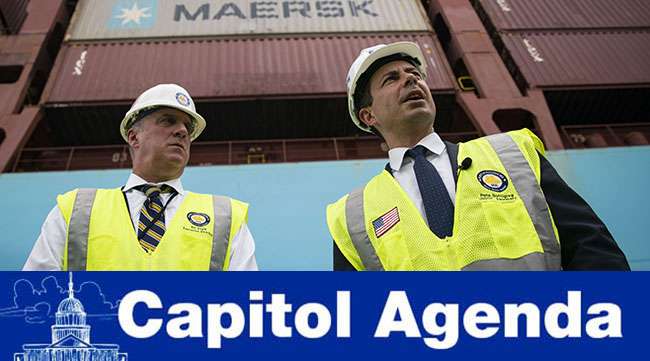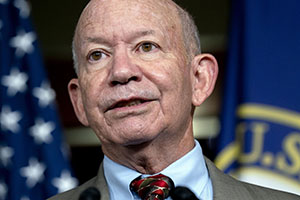Senior Reporter
US Senate Kicks Off $1 Trillion ‘Infrastructure Week,’ Potential Passage Thursday

[Stay on top of transportation news: Get TTNews in your inbox.]
“Infrastructure Week” finally arrived inside the Beltway, at least in the U.S. Senate.
This week, the upper chamber, led by Democrats, is scheduled to consider amendments and potentially hold a vote Aug. 5 on passage of a $1 trillion infrastructure policy package, which would provide about $550 billion in new funding for transportation programs.
The legislation, crafted by a bipartisan group of senators, including Arizona’s Kyrsten Sinema (D) and Ohio’s Rob Portman (R), aims to modernize connectivity networks, upgrade drinking water systems, expand electric vehicle charging stations nationwide and increase rural access to broadband internet.

Mulero
But wait, that’s not all. The bill also would update the country’s premier highway law (which expires at the end of September), and it would enhance programs associated with infrastructure grants at the U.S. Department of Transportation. Provisions specific to trucking pertain to an interstate driving apprenticeship for truckers younger than 21 and additional funds for motor vehicle safety operations.
The measure’s highlights include nearly $100 billion for upgrades to roads and bridges, $66 billion for freight and passenger rail operations, $46 billion for severe weather-resilience programs, $65 billion for expanding broadband internet, $39 billion for transit systems, and $25 billion for improvement projects at airports.
“So many people have given up on the Senate. They have given up on Congress. They have given up on our ability to be able to do the big things,” said Sen. Joe Manchin (D-W.Va.), one of the bill’s negotiators. “This is big. This is a big deal. I don’t care who is looking at it, any way they can. It’s been said that nothing like this has been done in 30 years.”
The bill would be partly paid for via unused federal COVID-19 emergency relief aid.
After more than a dozen Republicans signed off on considering the bill on the floor, signaling its potential passage, Majority Leader Chuck Schumer (D-N.Y.) said he would proceed with the start of a process that would set up a $3.5 trillion budget plan. The yet-to-be unveiled budget-centric measure, already opposed by Republicans, would target social, health care and environmental proposals specific to President Joe Biden’s “build back better” agenda.

House Transportation and Infrastructure Committee Chairman Peter DeFazio. (Stefani Reynolds/Bloomberg News)
On the House side, the chairman of the transportation panel, Rep. Peter DeFazio (D-Ore.), is asking senators to negotiate in conference with his House colleagues a final version of the $1 trillion infrastructure bill. And Speaker Nancy Pelosi (D-Calif.) continues to suggest the chamber will address the $3.5 trillion budget-centric measure parallel to the $1 trillion infrastructure package.
Meanwhile, the White House and Biden’s “Jobs Cabinet” are championing Congress’ focus on infrastructure. Speaking on the Sunday shows, Transportation Secretary Pete Buttigieg pointed to the potential benefits that would stem from massive investments in infrastructure.
“We’re talking about roads and bridges. We’re talking about ports and airports. We’re talking about rail and transit, not to mention the work that’s going on water, on broadband,” Buttigieg told ABC News. “There is no county, no community, certainly no state in this nation that won’t see improvements because of this. Just like every part of this country has seen the cost of us failing to invest over the last 10-, 20-, 40 years, the way that we should have been.”
The Week Ahead (all times Eastern)
Aug. 4, 10 a.m.: The Senate Commerce Committee considers the nomination of Jennifer Homendy to become chairwoman of the National Transportation Safety Board.
Aug. 4, 10 a.m.: The Senate Environment and Public Works Committee meets for a hearing on the nomination of Amanda Howe to be assistant EPA administrator for mission support.
Aug. 4, 10 a.m.: The Senate Appropriations Committee considers the “Energy and Water Development and Related Agencies Appropriations Act, 2022.”
Aug. 6, 11 a.m.: National Journal hosts a virtual discussion with Charlie Cook, founder of the Cook Political Report.
Freight Corridor
POTUS’ visit to truckworld leads to an announcement about “Buy American” guidelines.
Legislative Docket
The U.S. House recently passed a fiscal 2022 transportation funding measure that would dedicate $84.1 billion in discretionary spending for the U.S. Department of Transportation and related infrastructure programs. It represents an additional $8.7 billion, a more than an 11% increase, from the fiscal 2021 level.
Specific to trucking, the legislation allocates to the Federal Motor Carrier Safety Administration a $379.5 million operations budget and $506.2 million for safety grants.
The deck has been stacked for the wealthy and well-connected for far too long.@AppropsDems Chair @rosadelauro explains why @HouseDemocrats are investing #ForThePeople, not the powerful. pic.twitter.com/a0MMAGSdVP — House Appropriations (@AppropsDems) July 27, 2021
Appropriations Committee Chairwoman Rosa DeLauro (D-Conn.) touted the measure: “Our transformative and historic funding increases will create good-paying jobs, grow opportunity for the middle class and small businesses and provide a lifeline for working families and the vulnerable.”
 Buzz
Buzz

House Republicans are expected to amplify their opposition to Biden’s “human infrastructure” agenda, per sources, transportation observers.
Favorite Video
And here we go.
Favorite Tweet
This week in “This Town” news:
The chairman is not pleased... pic.twitter.com/sWWkqU4cII — Jeff Davis (@JDwithTW) July 29, 2021
The Last Word
Right-to-work laws give workers freedom. And more importantly, it gives workers the freedom to choose whether to unionize or not.
Sen. Tommy Tuberville (R-Ala.) on July 23
We publish weekly when Congress is in session. E-mail emulero@ttnews.com with tips. Follow us @eugenemulero and @transporttopics.
Want more news? Listen to today's daily briefing below or go here for more info:




